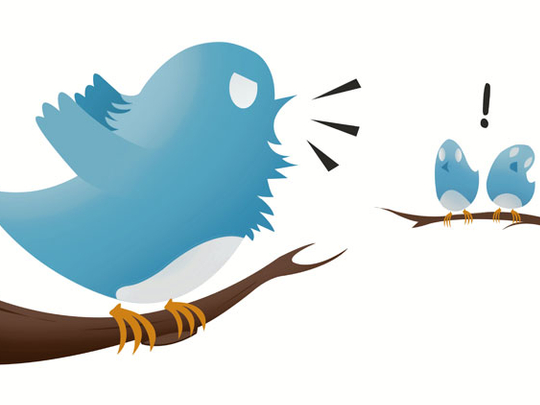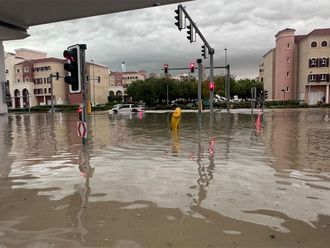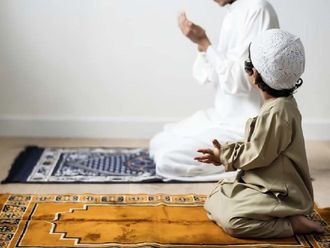
Tweets have sent people to jail, ended careers, exposed scams and even brought the downfall of entire regimes. Do people realise the power their posts can have? In a recent case in the UAE, a man was charged with cursing a public servant after he posted foul language on the Twitter account of the Dubai Police Chief Lt Gen Dahi Khalfan Tamim. We debate user responsibility on social media channel — Twitter.
14:32 Gulf News: How would you rate the level of responsibility shown by the majority of Twitter users?
14:35 Shan Fazelbhoy: Given that there are millions of users, I think people are generally fairly responsible.
14:37 Mohammad Al Olama: In my understanding the level of responsibility used in social media, especially Twitter, is far less than other media tools. People generally think: "It is OK, we can express whatever we want, it's just Twitter"; not realising how powerful a tweet can be.
14:42 Arfah Shahid: It's very hard to generalise. I mean, there are millions of Twitter users, each one using Twitter for a different agenda. If someone tweets with an aim to spread awareness, they will generally have more responsible tweets. However, if one is tweeting just to have fun and interact with people, they will generally not be as careful. All in all, it depends from user to user.
14:42 Dima Yousuf: Generally, people using social media are responsible or try to be. Unfortunately, some think they can say whatever they want regardless of who is out there.
14:42 Annie Al Sakar: People are very irresponsible! Thoughtless comments are often posted on Twitter! Because it is anonymous, or at least faceless, people become blasé.
14:48 Arfah Shahid: The reason could very likely be the openness of the platform and the fact that people are not aware of how powerful these mediums can actually be. Also, sometimes people are not aware of how strictly regulated media can be in some societies, and so they don't necessarily calculate the weight of their words.
14:49 Dima Yousuf: People need to understand that there are guidelines when they engage in an argument or debate, regardless of the platform.
14:49 Annie Al Sakar: We all think we have something worthwhile to say. A great big audience out there. But we have to take responsibility!
14:50 Shan Fazelbhoy: Platforms like Twitter and Facebook exist to make communication easier - ‘bring the world closer'. So, the openness of the platforms should not be blamed. We have to be continuously conscious of our actions.
14:50 Arfah Shahid: I agree - users should have a sense of responsibility and maturity to know what can be tweeted and what can't be. If there's something you will be uncomfortable saying in a public gathering, don't say it on Twitter because that's precisely what it is - a public gathering!
14:51 Dima Yousuf: Exactly. You should stand up to what you believe in and express your opinion, but you should avoid ad hominem [appealing to feelings or prejudices rather than intellect].
14:52 Mohammad Al Olama: I had an experience where I tweeted some inside information on an upcoming event and I got some upset phone calls, so it shows how important it is for a person to revise his or her tweets and bearing in mind all the readers and the way they observe your writings. Think before you tweet!
14:53 Simran Vedvyas: Facebook, and other social websites, including Twitter, are created with the aim of promoting an environment where everyone can connect and share comfortably. But a small fraction of people use it with an abusive attitude and make personal remarks and sometimes make judgmental comments about other people. This may be emotionally and mentally stressful for the person being attacked.
14:55 Shan Fazelbhoy: It is a question of knowing where to draw the line and having respect for other people. Things can be easily misconstrued and it is a very public forum, so we should perhaps be extra sensitive.
14:57 Dima Yousuf: Absolutely! I agree with Arfah and Shan. We are still dealing and conversing with people, so simple rules like respecting others still apply. Some might argue that this could be against one's freedom of speech. But even freedom has its set of rules.
15:03 Shan Fazelbhoy: I think it is a question of how you say it rather than what you say. There is always a nicer way to put across your viewpoint. Some people may have commented to later regret and thus goes the learning process.
15:04 Arfah Shahid: In terms of socio-political issues, especially in this part of the world, one has to be careful with how they word their opinions. You could get into trouble easily if precaution is not exercised.
15:05 Annie Al Sakar: I actually don't reveal my opinions in my comments purposely for that reason.
15:07 Dima Yousuf: When it comes to political and social issues, first we have to form an opinion about what we are willing to stand up for, because if you are passionate about a cause, then you will support or defend it no matter what. Again, the rules of argument should apply.
15:08 Gulf News: Do you think social media is encouraging freedom of speech and pushing the boundaries for what is acceptable in public conversation?
15:08 Arfah Shahid: I agree with Shan. It's a double-edged sword. Social media platforms can be good or bad, depending on how you use it. If you keep ethical considerations in mind, as a general rule before voicing anything, you're good.
15:08 Annie Al Sakar: It is very scary out there if you ask me! We've become too opinionated for our own good.
15:09 Mohammad Al Olama: True, Twitter has its pros and cons. We started a campaign to ban shisha outlets in neighbourhoods using a hashtag and within two days, the rule was passed to ban these places. So, you can benefit from Twitter and you can make a huge mistake as well. A double-edged sword, indeed!
15:12 Arfah Shahid: That's an interesting question. It could very well be on the agenda of these social media platforms, more so Twitter than any other. But we can make speculations, not really know for sure. It does, however, provide a platform for dialogue and discussions on many different issues that concern us and it's becoming easier to share knowledge and express conflicting viewpoints. It has become one of the most helpful platforms to facilitate dialogue, which one can say arguably is an essential step towards cooperation.
15:12 Shan Fazelbhoy: Given the massive number of Twitter users, there have not been a huge number of ‘misdemeanours' brought to light.
15:13 Gulf News: Do you think people realise that criminal law can be applied to what they do on social media platforms?
15:14 Annie Al Sakar: Everybody's the expert, but no they do not know that criminal law can be applied to what they tweet.
15:15 Shan Fazelbhoy: It's an easy place to vent your frustration and if someone loses control they may say something without realising the impact.
15:16 Arfah Shahid: I agree with Dima. It's important to express yourself in the right way. The Emirati man could have voiced his concerns/complaints in a decent manner without the abuse. With regards to your question, people are starting to realise how powerful their tweets can be after such incidents are brought to the limelight, and I think it could lead to people being more careful in the future on public forums. Social media has this way of making you feel like the centre of the universe when, in fact, you're just another click on the internet.
15:17 Mohammad Al Olama: It is easier to show off and express what you have or throw comments from behind a smartphone. Facing people is more difficult.
15:18 Annie Al Sakar: Yes, back to my point — it's anonymous.
15:18 Dima Yousuf: I think people don't realise the impact of their words in general and when they express their opinion, they ignore the fact that there are people on the other side. I believe we should learn how to respect others before we engage in a conversation on any platform.
15:20 Simran Vedvyas: I have been a victim of cyber bullying recently, but I was brave to handle it and still "walk the talk". It was because I had a lot of support from my family, friends and my mentors; but I can imagine how much of trouble it brings your way. Sometimes people don't realise this. But, I guess this debate certainly will raise some awareness.
15:20 Shan Fazelbhoy: Social media evolution is a process and we are going through it and learning all the time, so we're on the right track.
15:20 Arfah Shahid: Your own conscience will often tell you whether you're right or not. Mostly, it is the individual that needs to keep ethical considerations in mind. On a community level, I think you can't really discipline people. But yes, creating awareness by reporting incidents such as the one we are discussing today can prevent people from being disrespectful, even if it's just out of fear of being reprimanded.
15:22 Dima Yousuf: It is an individual journey, but it is also the responsibility of parents, and teachers — we have to realise that literacy is not just about reading and writing. There's information literacy too and unfortunately most are illiterate when it comes to that.
15:23 Mohammad Al Olama: You learn from example. Like in this case of the Emirati man, after this incident others are more careful. Respect others the way you want to be respected and a small advice — Twitter helped me a lot. It is a growing tool with magical results. Try to benefit from it.
What the tweets say:
@shivamLM: @GNReaders "Think before you speak" applies to twitter. I wouldn't say something on here I don't say in real life.
@jinoyviswan: @GNReaders Success of FB & Twitter is due 2 their capacity 2 let every1 poke their noses into others affairs. More like Gossip mongering.
@mahjabeenashraf: @GNReaders Ppl stoop to any low to gain popularity!! Sad thing.. Twitter is used in all ways poss[ible], nly to b d centre of attraction!!














